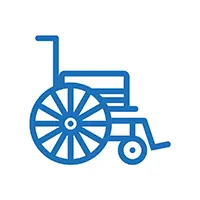Published 15 January 2019
Lara and Hayden Heta's lives were turned upside down when their second-eldest child, Harper, suddenly became paraplegic. She was seven at the time. The incident forced them to find ways to manage their new life, which revolved around managing Harper's needs as well as raising five other children.
Watch Lara and Hayden's story or read the transcript below.
You can also watch or read Harper's story by clicking the link below.
Harper's story: Refusing to be seen as disabled.
View the When your child becomes paraplegic video transcript.
Lara:
It was two and a half years ago and the first thing I got was a phone call from my mum. No, actually, before that I rang to see when the kids were coming home ‘cause they were on holiday with my mum and dad in Kaitaia.
And I heard some screaming and crying and Jett was on the phone, her youngest brother and I said, “what’s going on, Jett?” And [he said], “Oh, Harper’s had a fall but she’s ok mum she’s just really sore.”
And then I heard her screaming quite badly and I thought, oh, something’s really bad.
Hayden:
Actually I was at work at the time but Lara just rang up crying saying that Harper was in an accident and she couldn’t walk or couldn’t stand up.
Lara:
And so she gets on the phone and I said, “what’s wrong Harper?” And she said “I’ve broken my back”. And I said, “No you haven’t, that’s stupid, don’t be ridiculous.” And ‘cause Harper can be dramatic it’s in her nature to just be dramatic.
Hayden:
They took her to the doctors and then they end up flying her on the Westpac helicopter from Kaitaia to Starship which is where we met her.
Lara:
And I didn't panic much because I guess when you're in that mode you just think ok, what to do next? And that's been the whole journey but at that point it was just about talking to the doctors and getting her back to Auckland to Starship where I thought she needed to be.
Hayden:
We all shot to Starship at the time and… when we spoke to the doctors, it sort of hit then, [the] doctor said that, you know, didn't give her a very good chance of actually walking again. It was actually pretty devastating actually thinking about it now. I remember the day like it was yesterday, it was one of the worst days of our lives.
Lara:
[Harper was injured after doing a gymnastics move]. And she nailed the move but in the process she'd over stretched her spine and at the T-2 level, which is about [waist level], there was an embolism that killed the nerves and in your spine the nerves, they don't grow back and they died and she was paralysed from there down.
Hayden:
She was in hospital for a couple of months. She was at the Wilson rehab centre in Takapuna for another three months there. Just, you know, just so she can adapt to life because it's all changed, it's all new from what she's used to.
Lara:
Not being able to walk, it's so frustrating. Her not being able to walk. I see her friends running ahead of her and she can't keep up. It's hard. And here she is just pushing her wheelchair behind them, trying to be a part of them.
Yeah, it's really hard. I went to a school trip and wore my sunglasses the whole day 'cause I cried all day 'cause I was pushing her to keep up with them. And they were so amazing with her but still, you can see the differences. And she lives with that everyday and I had a glimpse of that.
Hayden:
Her attitude is unbelievable. I mean, I look at her sometimes and get a bit emotional because the stuff she takes day to day is different to able bodied people but she sort of just gets on with it.
Harper's got a lot of different things, and we have to catheterise her every four hours. Probably the things you take for granted. We have to turn her at 11 o'clock and three o'clock in the morning everyday, and I think we turn her, we turn her because hopefully so she doesn't get bed sores or anything like that.
Lara:
I've got a two year-old, she's 10, and the kids in between. As long as we stick to her times or around those times she's usually pretty cool. When I'm doing her stretches and rehab, the kids are jumping around her, on her. They're always amongst it, actually. They never just go off and be, you know, go away. They always wanna be a part of Harper and vice versa, Harper wants to be a part of what they're doing.
I'm actually proud that Harper can call on her younger siblings. You know, that's what it's like for them. They know nothing different and they just call on one another for help.
And you just do it because I'm so busy with five of them that sometimes she does come second or last and she does have to wait because I don't treat her any different unfortunately, I just think she has to become normal like them and know that she's not treated as the favourite, or the special one 'cause that's not going to help her in life to come either.
Hayden:
For me, I try and spend as much time with all the kids as possible and I sort of cherish it a little bit more, I think, than I would normally.
Lara:
It's taught our family that through everything you just have to love one another. It's taught us more about who Harper is. At such a young age she's so determined, she's so strong, she's so resilient it's ridiculous.
Hayden:
She's tough. She's got one of those auras that, you know, people like to be around her, she's infectious.
Lara:
One thing Harper gets is obviously she's in a wheelchair so people stare all the time. And she kinda likes it, she likes the attention but I don't know, if people actually started talking a bit more, don't be scared. Just say, hey, how's it going? What happened to you? You know?
Yeah, I think if people were more open to learning about people with different abilities they'd find that there's a whole other world out there and that these kids with different abilities are rocking at life like we wouldn't even understand.
I could rattle off [the names of] so many kids that we know right now that are just so cool and they're in every sport you can think of possible, and they're so smart, but ultimately they just want to be treated normal. So yeah, if you see them, talk to them. They love it.














